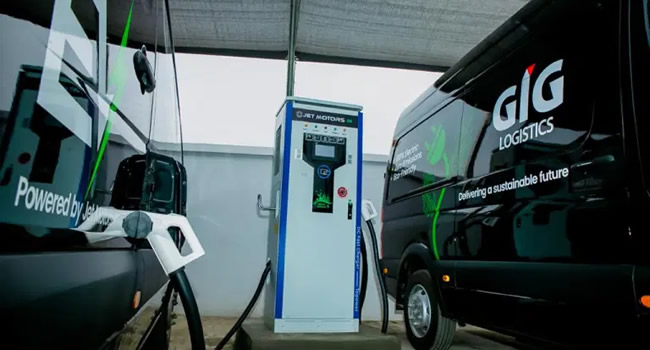Business
GIG Logistics, JET Motor sign historic deal on electric vehicles

History was made in Nigeria’s last-mile business on Friday as Africa’s fastest growing e-commerce logistics company, GIG Logistics, and JET Motor Company struck a deal to launch the first electric vehicles in the country’s delivery market.
GIGL partnered with JET, a car assembly firm, to phase out internal combustion engine from its logistics’ cargo bus fleet, replacing them with EVs in line with UN Environment’s Electric Mobility Programme.
While countries are gradually easing out fossil fuel, Nigerian roads are still occupied by emission vehicles, with the logistics market polluting the environment as they deliver goods across the country.
Disrupting the logistics market
The deal with JET is meant to be the beginning of the end for internal combustion vehicles in the last-mile sector as GIGL takes the first step among market players to start delivering across locations in electric cargo buses.
The Friday event witnessed the delivery of the first batch of electric vehicles assembled in Nigeria with more EVs expected to be delivered until the deal runs out.
Details of the deal were made known during the signing of a Memorandum of Understanding by Ocholi Etu, the Director of Operations, GIG Logistics and Wemimo Joseph, Head of Strategy (Jet Motor Company), at GIG Logistics Digital Hub, Lagos, Nigeria.
Others at the signing of the MoU were: Rupani Sanjay, Director, Sales & Marketing for Jet Motor Company and Odafe Ojomah, Deputy Director, Expansion and Growth of GIG Logistics.
The officials of both companies said though the cost of phasing out the emission cargo buses were on the high side, that they were confident that GIGL will recoup its investment within a year.
The logistics firm said it would deploy the EVs for its intra-city deliveries in the meantime while plans are afoot to expand its network to other Nigerians cities as supporting infrastructures are established.
Dealing with challenges
Speaking at the event, Joseph highlighted dilapidated infrastructure as part of the challenges faced in achieving the futuristic goal of putting electric mobility on Nigerian roads.
“The journey towards transforming the transportation sector has not been without major challenges. We have had to battle with inconsistent govt policies, poor infrastructure like epileptic power, lack of direction from government on EVs, and limited funding support.
“These challenges cannot be the norm if Nigeria is to replicate what its counterparts are doing to support the mainstreaming of electric vehicles.”
He expressed hope that Nigeria could replicate the successes recorded in Europe, Asia and America if the right supports were in place.
“We must have a deliberate policy backed by far-reaching concrete actions on mainstreaming the production, deployment and use of EVs in Nigeria.” Joseph said.
Despite the challenges, Etu said GIGL was willing to soldier on as the firm intends to deliver zero carbon logistic service as part of its strategic goals.
“The launch of these Electric Vans is the first practical step in our journey towards carbon neutrality which is a core strategy for us. We are the first Nigerian and, perhaps, African company in the logistics space to be able to deploy Electric Vans for operations.”
he said.
He went on to advise the government to follow in their footsteps by investing in transportation infrastructure for sustainable energy as it would increase opportunities for businesses operating within the country.
“We want to encourage the government to take a cue from what we have done by investing in sustainable energy infrastructure for the transportation sector, helping to create a whole new ecosystem that will expand opportunities for Nigeria’s businesses. The transition from ICE to EV must be urgently prioritised”, he stated.
While addressing the partnership, Joseph had said, “JET is so proud to be delivering these EVs to GIG Logistics. We consider them a worthy partner in logistics mobility innovation. We strongly believe that with their track record in the industry, they will best represent this much needed shift towards the future.”
By Fakoyejo Ayodeji…
Join the conversation
Support Ripples Nigeria, hold up solutions journalism
Balanced, fearless journalism driven by data comes at huge financial costs.
As a media platform, we hold leadership accountable and will not trade the right to press freedom and free speech for a piece of cake.
If you like what we do, and are ready to uphold solutions journalism, kindly donate to the Ripples Nigeria cause.
Your support would help to ensure that citizens and institutions continue to have free access to credible and reliable information for societal development.
































